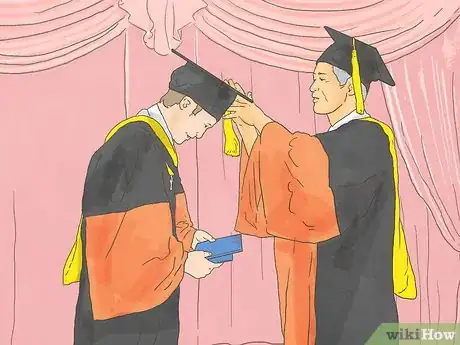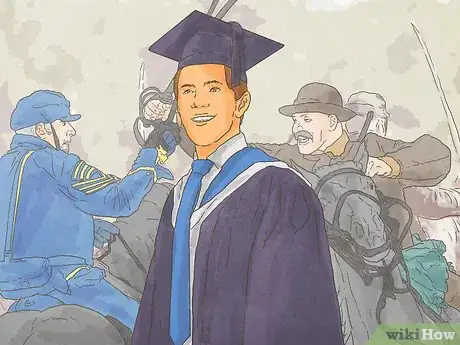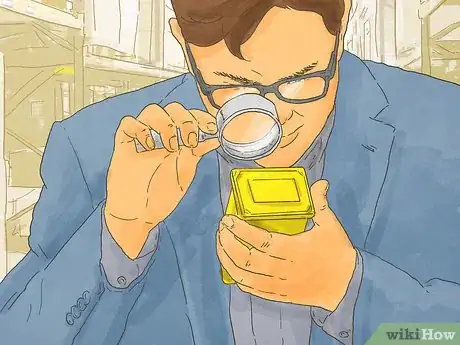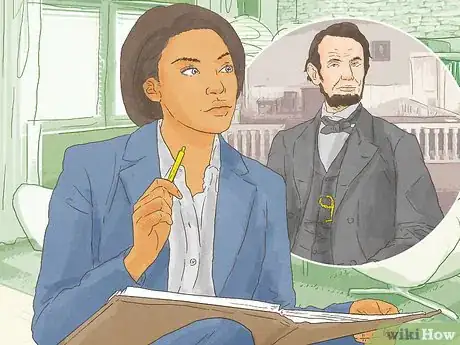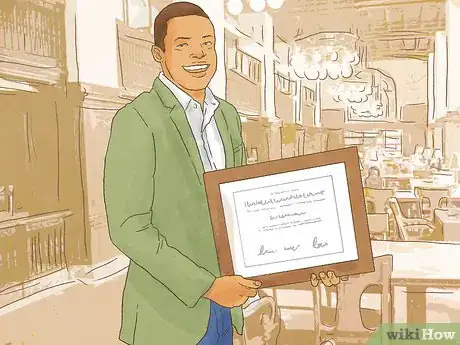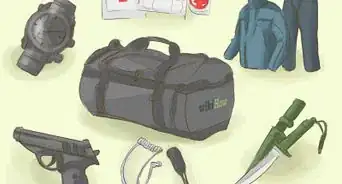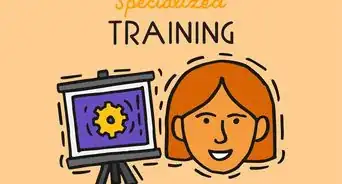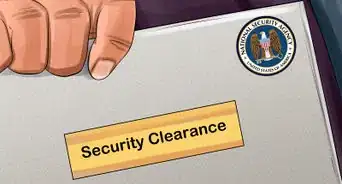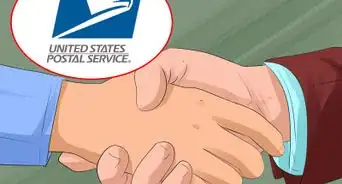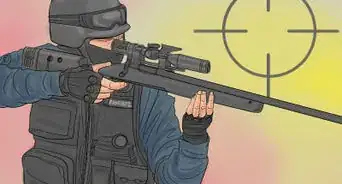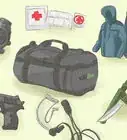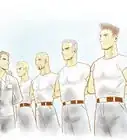This article was co-authored by wikiHow Staff. Our trained team of editors and researchers validate articles for accuracy and comprehensiveness. wikiHow's Content Management Team carefully monitors the work from our editorial staff to ensure that each article is backed by trusted research and meets our high quality standards.
There are 9 references cited in this article, which can be found at the bottom of the page.
This article has been viewed 31,199 times.
Learn more...
There are many paths to becoming an archivist, but a useful first step is getting an advanced degree (either a master’s or doctoral degree) in a relevant field. Most archivists have degrees in history and/or library science, but other degree programs might also prove useful. Develop your skills by joining a professional archival science organization, gaining certification, and attending conferences. Once you have a degree and some relevant skills, check job boards to gain employment. If you can’t find a job right away, volunteer at your local museum or other archival institution to acquire some useful experience.
Steps
Getting an Education
-
1Get a master’s degree in library science (MLIS). An MLIS is the most common educational requirement for becoming an archivist. The best MLIS programs will have a curriculum enriched by courses in record keeping, archival administration, and born-digital documents that can familiarize you with archival processes and practice.[1]
- MLIS courses will offer training in both libraries and archives. Most MLIS programs focus more on libraries than on archives, but tend to balance in the other direction.
- Coursework will prepare you to organize and retrieve information, develop indexes and catalogs for library users, and teach you to use the controlled vocabularies of your national library classification system.
- To get into a graduate program in history, you will need an undergraduate degree, but MLIS students tend to come from a wide range of undergraduate backgrounds. If you're interested in general archival work, an undergraduate degree in history or museum studies could help. If you want to work with electronic archives, a degree in computer science or digital technology might help.
-
2Get a degree in history. Instead of (or in addition to) an MLIS degree, an advanced degree in history may also provide you with a route into archival work. This is especially true when you want to work in a particular archive or a particular field of archival science.[2]
- For instance, if your long-term goal is to work at an archive specializing in early American history, you’d have a better chance of finding work at such an institution if you’ve done graduate-level academic work in early American history.
- To get into a graduate program in history, you typically need an undergraduate degree in a related field. Specifications vary depending on the school you're applying to. Undergraduate degrees in history, political science, or sociology will probably best enable you to enter and succeed in a graduate-level history program.
- A graduate program in history will require several years of seminar courses on various topics in history.
- Master's degrees typically require a thesis based on original historical research.
- PhDs require a longer and more intense research process which results in a dissertation. PhD candidates are also expected to pass series of comprehensive exams that test your general knowledge of broad historical themes.
Advertisement -
3Get an archival science degree. A small but growing number of schools now offer degrees in archival science. These programs are less common than those in history or library science, but they offer another great way to prepare for a career in archival work. In such a program, you’ll be able to learn about provenance, archival theory, arrangement, and description of archival materials.[3]
- Longer master's degree programs typically require the production of a thesis that closely examines a relevant topic or problem in archival science.
- If you can’t get an advanced degree in archival science, you might be able to complete a shorter certificate program that focuses on archival studies.
- Certification programs can often be completed in two or three semesters.
-
4Obtain another specialized degree. Several other advanced educational degrees might prove useful in pursuit of archival work. These degrees include public administration, political science, museum studies, and public history.[4]
- A law degree might be of use in obtaining work in a legal archive.
- English and other liberal arts courses that emphasize writing and research can be beneficial for budding archivists.[5]
- The applicability of a particular degree to a particular job in an archive largely depends on the needs of the institution.
Developing Your Skills
-
1Sharpen your research and writing skills. Since researchers -- including historians, sociologists, journalists, lawyers, and political scientists -- are the primary archival users, understanding the research process and knowing what sort of sources could be useful can make you a more effective archivist. The best way to develop strong research and writing skills is to earn a degree in history, English, sociology, or another research and writing-intensive major.[6]
- You could also sharpen your writing skills by publishing a blog about a topic you are interested in but know little about.
- Since it can be difficult or impossible to objectively evaluate the quality of your own research and writing, show your work to strong writers and ask for feedback.
- Join a writing club in your area (preferably one that focuses on nonfiction writing) to connect with others who can help you develop strong research and writing abilities.
- Strong research and writing skills can help you draft useful finding aids -- the guides that let archival users know what the archive contains.
-
2Select a specialization. Having a special area of knowledge can make you more attractive for archival institutions. These specializations are both topical and format-based. Topical specializations include advanced knowledge of a particular collections area such as labor, Asian-American history, modern British culture, ecology, and so on. Format-based archival specialization includes familiarity with a particular type of archival material, including photographs, digital records, cassette tapes, and so on.
- The utility of a particular specialization is impossible to gauge, since each archival institution has different collections policies and needs.
-
3Obtain professional certification. While professional certification is not always necessary to obtain work as an archivist, it certainly enhances your resume. The particular process by which you obtain certification depends on the certifying organization.[7]
- Generally, however, you will need to register for a certification exam and pay an application fee.
- The specific areas of archival science on the certification exam vary depending on the organization. Take advantage of online study guides provided by the certifying organization to identify the topics the exam addresses.
- If possible, take sample exams in order to familiarize yourself with the sorts of questions you’ll encounter.
- Professional certification might not be offered year round. Contact the certifying organization for more information about when and where you can take the certification exam.
-
4Learn a foreign language. Many archives contain documents in foreign languages. While the applicability of this skill depends on the institution to which you apply for work, if you know that you are interested in working in an archive that deals largely or primarily with foreign-language documents, learn to read that language.[8]
Gaining Professional Experience
-
1Join a professional organization. Most countries have local and/or national archivist organizations. These organizations can be important sources of information and career advice for people like you who are trying to get their foot in the door. They also host conferences where you can network with other archivists and learn about current trends in archival practice.[9] Finally, some professional organizations offer mentor programs that pair you with an experienced archivist to help you achieve your career goals.[10]
-
2Volunteer at an archive. Local history museums and historical institutions often need volunteers. As an archival volunteer, you might gain hands-on experience in processing, arrangement, description, and digitization. This volunteer experience looks great on a resume when you go out to look for a job as an archivist.[11]
- Many archival science programs require students to conduct a practicum as part of their degree requirements.[12] This volunteer experience is also useful for professional development.
- If possible, volunteer or do your practicum at an institution similar to one where you wish to obtain work as an archivist.
- For instance, if you want to specialize in labor archives, volunteer at a museum that deals with labor or labor issues, or request to work on a collection pertaining primarily to labor issues.
-
3Search for a job in an archive. Once you’ve met the relevant educational requirements for work as an archivist, start checking job boards for archival work. Take advantage of your network in order to find work opportunities, too. Former classmates, professors, and mentors can be of great help in the job hunt. Apply to as many jobs as you can.[13]
- If you’re finding that you’re having a hard time finding jobs that are relevant to your skill set, consider getting an additional degree.
- For instance, if your history degree alone seems to be insufficient in helping you get a job as an archivist, consider going back to school for an MLIS degree or a certificate in archival administration.
-
4Write a resume and cover letter. The process of writing a cover letter and resume will vary depending on the archive you're applying to. Tailor a general resume and cover letter to the specific job you're applying to.[14]
- For instance, if the archive is looking for someone skilled with born-digital documents, highlight any experience you've had working with such materials.
- Emphasize how your education, volunteer experiences, and relevant personality traits (such as being detail-oriented, creative, and capable of working both alone and on a team) would make you a strong asset to the archive.
-
5Apply for the job. With your customized resume and cover letter in hand, you're ready to send it in. Most archives will ask you to send an email including your cover letter and resume. In this case, you can usually just copy and paste the cover letter into your email. Other archives might want you to apply through an online portal, in which case you'll have to upload your resume and cover letter.
- Unless otherwise directed, call the archive after a few days to follow up on your application. This will show you are interested in the job.
- For example, ask the archivist "Have you gotten a chance to look over my resume yet? I'd love to talk more about how my skill set could contribute to the successful operation of your archive."
References
- ↑ https://www2.archivists.org/careers/beanarchivist
- ↑ https://www2.archivists.org/careers/beanarchivist
- ↑ http://slis.wayne.edu/certificates/archival-administration.php
- ↑ https://www2.archivists.org/careers/beanarchivist
- ↑ https://siarchives.si.edu/blog/some-archival-career-advice
- ↑ https://siarchives.si.edu/blog/some-archival-career-advice
- ↑ http://learn.org/articles/What_Degree_Do_I_Need_to_Become_an_Archivist.html
- ↑ https://siarchives.si.edu/blog/some-archival-career-advice
- ↑ https://www2.archivists.org/careers/beanarchivist
